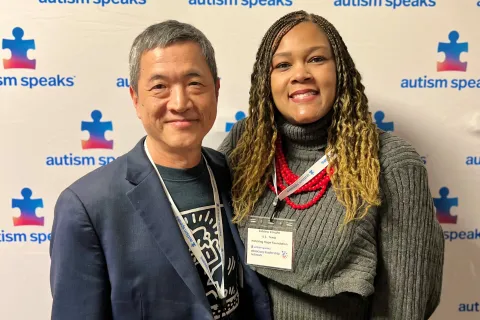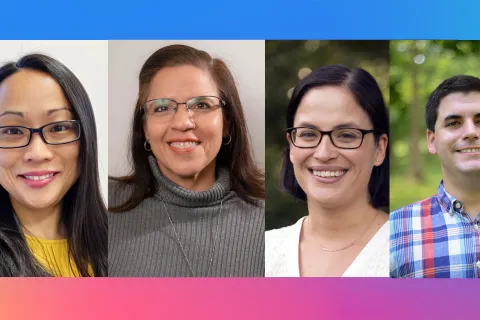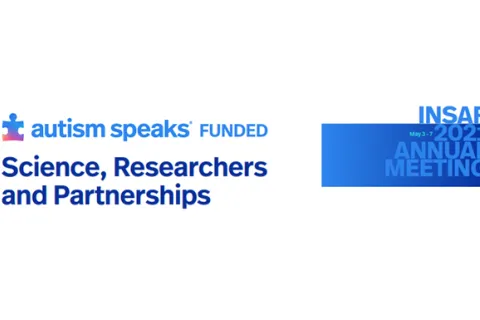Autism Caregiver Training: Helping families
April 10, 2017Autism Speaks answers your questions about a program that’s empowering parents and improving lives in underserved communities in the U.S. and around the world
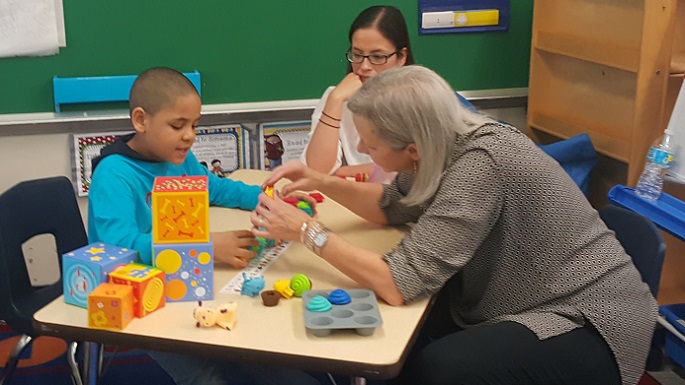
The World Health Organization Caregivers Skills Training – developed in collaboration with Autism Speaks – is a practical and culturally adaptable training program to foster the social and communication skills of children with autism and other developmental issues, with a special focus on families in underserved communities.
The program aligns with Autism Speaks’ mission to increase understanding and acceptance of autism, increase early-childhood screening and intervention and ensure access to reliable information and service throughout life.
The program trains Master Trainers and Facilitators, who in turn train parents and other caregivers to use scientifically proven strategies for promoting child development, reducing disruptive behaviors and strengthening their own coping skills.
Last year, Autism Speaks and WHO began the global rollout of Parent Skills Training with Master Trainer workshops and pilot programs in the Philippines, South Korea and South America. The year also brought commitments from more than 20 governments to implement the program.
In 2017, Caregiver Skills Training debuted in the United States, with a Master Trainer workshop to train specialists who will pilot the program in two predominantly Latino and African American neighborhoods in Newark, New Jersey. Based on the results and refinements of this and other pilot studys around the world, Autism Speaks will help roll out programs nationally as well as abroad. (Stay tuned to this column for updates.)
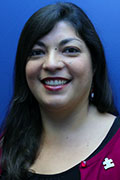
We sat down with Lucia Murillo, Autism Speaks’ assistant director of education research, to discuss the program’s early successes and challenges and its promise to advance the organization’s mission to “enhance lives today and accelerating a spectrum of solutions for tomorrow.”
What was the inspiration behind the development of the Caregiver Skills Training program?
In our international work, it started from what we heard from parents and other caregivers in the countries we visited. Many of these parents went to great lengths and expense to get their children evaluated. But a diagnosis of autism didn’t necessarily lead to services or even information about the condition. For instance, on a trip to Albania, I heard from parents, teachers and healthcare professionals about how they didn’t know what to do to help a child diagnosed with autism. “We don’t have the skills. We don’t have support,” they told me. We’ve heard these concerns in many parts of the world. Professional behavioral therapy isn’t available to all – or even most – families in many countries.
In that kind of setting, Caregiver Skills Training is an intervention that parents and other caregivers can use to help their children when professional services are lacking. The strategies give parents skills that improve how they interact with their children and deal with challenging behaviors. The goal is for the parents to help foster their children’s communication and, when possible, their language skills. The emphasis is on skills that the parents and their children can use daily as they participate in activities at home, school and play.
One of the most important aspects of our pilot testing is to gauge how feasible it is to adapt this program to different communities and cultures around the world – including here at home.
What kind of expertise do you and your local partner organizations look for in a Master Trainer?
In general, our Master Trainers have some specialized training in child development that includes autism or related developmental delays or disabilities. In some countries, our Master Trainers include child psychologists, special education teachers, speech therapists and developmental pediatricians. In Newark, we trained three members of the Mom2Mom team. They’re not only parents of children with autism. They’re clinicians with backgrounds in behavioral intervention and training as peer mentors who provide support to families who call their help line. In addition, we trained two members of the Newark school district’s special education team and a social worker with Rutgers University Behavioral HealthCare.
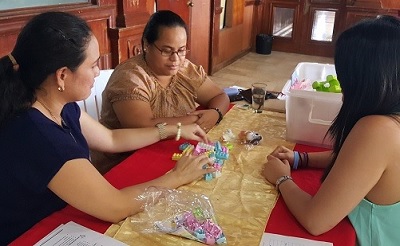
How does the training provided to Master Trainers ultimately reach parents and other caregivers?
In many of the countries where we work, the Master Trainers have a lot of ground to cover. So the Master Trainers train non-specialists we call Facilitators. The Facilitators go back to their local communities to conduct group programs and visit individual homes to share the strategies with parents free of charge. Many of our facilitators are teachers, social workers, nurses and other community workers. They also include parents who are taking a leadership role in the autism community in their region.
However, we have no strict parameters for who is a Master Trainer or who is a Facilitator. Flexibility is key to adapting the Parent Skills Training program work in different communities and cultures at home and around the world.
What does the Caregiver Skills Training program bring to families in countries like ours where we have professional services?
This program was developed with the needs of underserved communities in mind, and these underserved communities exist here at home as well as abroad. We know, for example, that there are long waiting lists for services in many large metropolitan areas, and many people who live in rural areas have to drive long distances to get specialized care for their children. Even when their children are enrolled in therapy programs, parents may feel, rightly, that the services fall short of what their children need.
So in this country as in other high-income countries, Parent Skills Training is not meant to take the place of specialized services. Instead, it’s a way to supplement professional services and/or fill gaps while children are on waiting lists for these services.
The opportunity to launch our first U.S. workshop and evaluation study came through a grant from the Healthcare Foundation of New Jersey, in collaboration with our partners Mom2Mom of New Jersey. Mom2Mom is a program of Rutgers University Behavioral HealthCare. Its staff and volunteers operate a free, confidential, peer counseling helpline for mothers of children with special needs including autism.
We held our New Jersey Master Trainer workshop in January. The Master Trainers will soon be sharing what they learned with parents and teachers in two predominantly Latino and African American communities in Newark. As part of our study, we’ll be evaluating how well the program works in this new setting.
What are the plans for the Caregiver Skills Training program in Newark?
Two of our Mom2Mom Master Trainers will conduct a pre-pilot study that will evaluate how well the Caregiver Skills Training program works in Newark and how we might improve it. In preparation, they will take the strategies they learned in the workshop and practice them with an initial group of eight to ten families. They’ll be videotaping these sessions and sending them to us and our WHO collaborators. We’ll be able to review the video tapes and provide feedback on how they’re applying and sharing the strategies. This will also allow us to identify unanticipated challenges in adapting the program to best serve this community.
Once we’ve reviewed and provided feedback, the Mom2Mom team will invite a second group of eight to ten families to receive the training. During the program, the Master Trainers will make three home visits with each family and nine group sessions over three months. In selecting the families, they will invite those who have children between the ages of 2 and 9 who have a diagnosis of autism or another developmental disability or delay such as Down syndrome.
The program will be offered to families free of charge, which is our goal in all the countries where we work.
Please describe an example of a Caregiver Skills Training strategy designed to foster communication in a child?
We continue to revise and adapt the strategies we use in the program. That said, many of them focus on giving caregivers foundational skills and basic knowledge that will help them interact with their children in ways that foster the development of social and communication skills. As part of this, we discuss the different ways children communicate and the importance of speaking at the child’s developmental level.
For example, let’s say a child’s language skills are limited to one-word utterances. We teach the families to expand on this by repeating the word back to the child as part of a two-word phrase. So if the child says “juice,” the parent might reply “apple juice.” Similarly, we encourage play-based learning. For example, if the parent and child are building a block tower together, the child might say “block” when it’s his turn to place a block. The parent would encourage this by expanding on what the child said by saying “red block” when she places her block. In these ways, the parent focuses on responding to the child at his or her developmental level while encouraging social interaction.
Most of our communication strategies focus on following the child’s lead. When we respond and imitate what they say or do, the children see that we heard them and are paying attention. This is different from approaches where adults guide the interaction and ask the child to say something. Instead, we focus on giving the child the time to initiate communication without prompts, which is a more natural social interaction.
Please describe an example of a Caregiver Skills Training strategy designed to help a parent or other caregiver cope with the challenges of supporting a special-needs child?
We know that it’s important for parents and other caregivers to take care of themselves. It’s the familiar airline analogy of putting on your oxygen mask before helping others. So our program gives caregivers tools to help them deal with the stress of taking care of a child with a disability. One way we do this is by incorporating a three- to five-minute wellness and calming activity at the start of every group session. This is similar to a guided meditation, with the caregiver taking slow, deep breaths and silently repeating a calming word such as “relax” or “peace.” We want to encourage parents and other caregivers to practice these self-care strategies at home when they feel their stress levels rising. They are brief enough to be manageable for a busy family.
We also describe a series of steps that parents can use to help problem solve a situation. This includes considering the nature of the problem, listing possible solutions and weighing the pros and cons of each before trying them out.
All these self-care strategies recognize that caregivers feel overwhelmed sometimes. We want them to feel like they have tools to make parenting more manageable.


